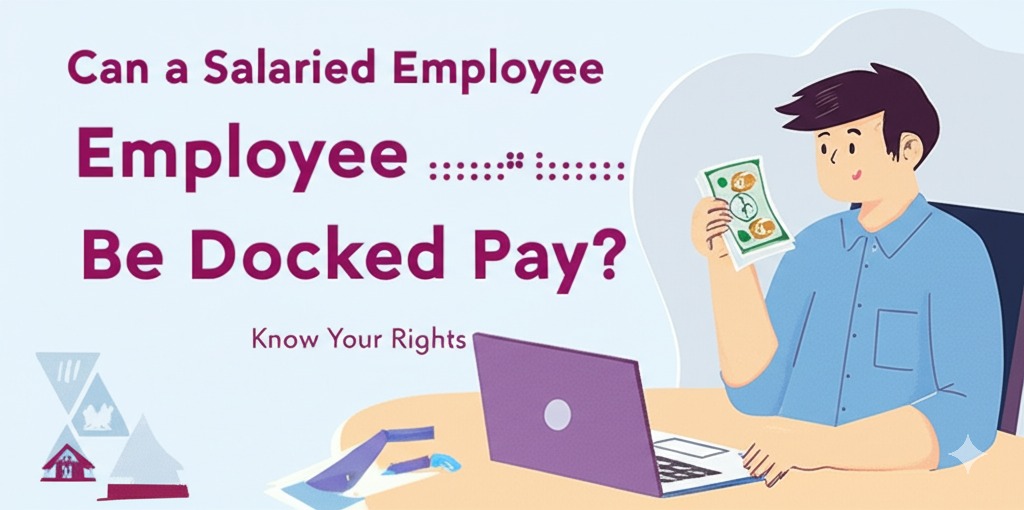
When you’re a salaried employee, you might assume that your paycheck is predictable—same amount, every pay period. But what happens when you’re late, miss a day, or take extended leave? Can your employer dock your pay even if you’re salaried?
It’s a question that stirs up confusion and concern—and rightly so. The answer isn’t always a simple yes or no. It depends on federal labor laws, state regulations, and the specific circumstances. In this article, we’ll break down what you need to know about pay deductions for salaried employees, what’s legal, and what isn’t.
Understanding the Basics of Salaried Employment
What Does It Mean to Be a Salaried Employee?
A salaried employee is paid a fixed amount of money regardless of the number of hours worked. This is different from hourly employees, who are paid based on the time they work.
Typically, salaried employees are considered exempt employees under the Fair Labor Standards Act (FLSA), which means they are not eligible for overtime pay. But with this exemption comes certain protections—like consistency in pay.
The FLSA and Exempt Status
Under the FLSA, exempt employees must:
- Be paid on a salary basis
- Earn a minimum weekly amount (as of 2024, it’s $684 per week)
- Perform exempt job duties (like executive, administrative, or professional tasks)
Being “paid on a salary basis” means that the employee regularly receives a predetermined amount of compensation, which cannot be reduced because of variations in the quality or quantity of their work—with a few exceptions.
When Is It Legal to Dock a Salaried Employee’s Pay?
So, can a salaried employee ever have their pay docked? Yes—but only in specific situations outlined by the FLSA.
Permissible Deductions from a Salaried Employee’s Pay
Here are the key scenarios where pay docking is legal for salaried, exempt employees:
- Full-day absences for personal reasons (not sickness or disability)
- Full-day absences due to illness or injury, if the employer offers a bona fide sick leave plan and the employee has exhausted it
- Unpaid disciplinary suspensions for violations of workplace conduct rules (typically major infractions)
- First or last week of employment, if the employee does not work the full week
- FMLA-related absences (Family and Medical Leave Act), even for partial days
Important: Employers cannot deduct pay for partial-day absences. If you leave early or come in late, your pay should remain the same—unless you’re not truly exempt.
When Is It Not Legal to Dock a Salaried Employee’s Pay?
To maintain exempt status, employers must not dock pay for minor infractions or partial-day absences. If they do, it may jeopardize the employee’s exempt classification.
Examples of Improper Pay Deductions
- Leaving two hours early for a doctor’s appointment
- Taking a long lunch break
- Arriving late due to traffic
- Missing a half-day without paid time off
These instances should not result in a pay cut. If they do, the employer may be required to reclassify the employee as non-exempt, making them eligible for overtime.
What Happens If Your Employer Makes Improper Deductions?
If improper deductions are made:
- You may lose your exempt status
- You could become eligible for back pay and overtime
- The employer may face penalties from the Department of Labor
Employees who notice inconsistent or unfair pay practices should document the issue and contact HR or the Department of Labor for clarification.
Exceptions and State-Specific Laws
State Labor Laws May Offer More Protection
While the FLSA provides a federal baseline, state laws may impose stricter rules. For example:
- California prohibits deductions for partial-day absences even more aggressively.
- Some states require written employee consent for certain deductions.
Always check your state’s labor laws or consult with an employment attorney for guidance.
How Employers Can Stay Compliant
Employers can protect themselves and their salaried workers by:
- Keeping clear policies on time off, sick leave, and disciplinary actions
- Properly classifying employees as exempt or non-exempt
- Avoiding partial-day pay deductions for exempt employees
- Training HR staff on FLSA compliance
FAQs About Docking Pay for Salaried Employees
Can salaried employees be docked for being late?
No, exempt salaried employees cannot be docked for being late—unless they are not truly exempt.
Can an employer deduct pay for jury duty or military leave?
Not if the employee works any part of the week—unless the absence is unpaid leave under FMLA or similar legislation.
What if I’m salaried but still get deductions for hours missed?
You may be misclassified, or your employer may be violating the law. Seek legal advice or report the issue to your state’s labor board.
Final Thoughts: Know Your Rights as a Salaried Employee
Being salaried doesn’t mean you’re immune to deductions—but it does mean that your paycheck should be fairly consistent. The FLSA protects your right to regular, predictable pay, and employers must follow strict guidelines when it comes to docking wages.
If you think your employer is making improper deductions, don’t stay silent. Review your pay stubs, check your classification, and reach out for help if something feels off.
Need more clarity on wage laws or employment rights? Check your state labor department’s website or consult with an employment lawyer to protect your income and classification status.

Andre Cuevas provides career insights, job search strategies, and professional advice to help individuals navigate the job market and achieve their career goals.






